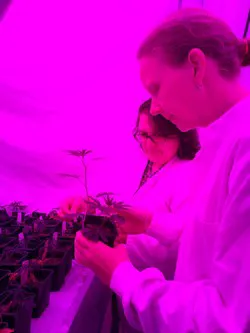Uniformity of the plants and predictability of the crop are key factors for successful production of medicinal cannabis. Growing medicinal cannabis therefore requires a high level of control over the production process, which is possible in greenhouses but even more so in indoor farms. LED lighting may be used to control the different developmental stages of the cannabis crop. Wageningen University and Signify have now made the next steps in a research program that aims to control the different developmental and growth processes, such as rooting, canopy establishment, flower induction and formation of secondary metabolites in the inflorescences.
Light to control your crop growth
Often the variability of plants is already present at the start of the crop, which makes crop uniformity challenging. Therefore, certain measures can be taken to minimize the plant differences and grow a uniform crop. LED lighting can help enhance plant uniformity and quality when the right light recipe is applied. A LED light recipe is defined by the light spectrum, intensity, the photoperiod and the timing of that period.
Plant hormones are affected by LED light
Medicinal cannabis is commonly propagated by stem cuttings, which is usually preferred over propagation by seeds because it is a low-cost method and it delivers genetically uniform plants. Auxins and carbohydrates are plant hormones and play a key role in adventitious rooting in cannabis: a critical process in the propagation of stem cuttings. A powder containing synthetic auxins is often applied because it improves rooting and uniformity among plants. When no rooting powders with synthetic auxin can be used, the rooting is rather slow and very variable. Important to know is that auxins and carbohydrates are both affected by LED light. Preliminary results now indicate that the rooting of stem cuttings can be enhanced by using the right light recipe.
The perfect light recipe for rooting
Now, the rooting process of medicinal cannabis is being studied in detail. Cuttings from the tops of the stems are put in pots and placed in rooms with a controlled environment. In a series of experiments, a range of spectra and intensities are tested for their effects on the formation of adventitious roots of cuttings treated with and without auxins. Subsequently, the effects of light are assessed on the development of the cuttings as well as on the morphology of the formed canopy. Thereafter, we investigate the effects of the light regime on flower induction.
 In June 2019, Signify and WUR expanded their ongoing research program to determine the effects of Philips LED lighting on compounds and plant characteristics of medicinal cannabis crops. In this unique research project, they develop specific light recipes for medicinal cannabis based on a fundamental understanding of the influence of light on crops to enhance purity and composition of cannabinoids. In this series of articles Leo Marcelis from Wageningen University explains what the effects of LED lighting are on improved yield, flowering and other plant characteristics.
In June 2019, Signify and WUR expanded their ongoing research program to determine the effects of Philips LED lighting on compounds and plant characteristics of medicinal cannabis crops. In this unique research project, they develop specific light recipes for medicinal cannabis based on a fundamental understanding of the influence of light on crops to enhance purity and composition of cannabinoids. In this series of articles Leo Marcelis from Wageningen University explains what the effects of LED lighting are on improved yield, flowering and other plant characteristics.
Leo Marcelis is professor of Horticulture and Product Physiology at Wageningen University, The Netherlands. Leo has a vast experience in researching the physiology, growth and product formation of plants in order to improve sustainability and quality of crop production in greenhouses and vertical farms. Plant responses to LED lighting is a focal point of his research.
For more information:
Global Marcom Manager Horticulture at Signify
Daniela Damoiseaux
Tel: +31 6 31 65 29 69
E-mail: [email protected]
www.philips.com/horti
